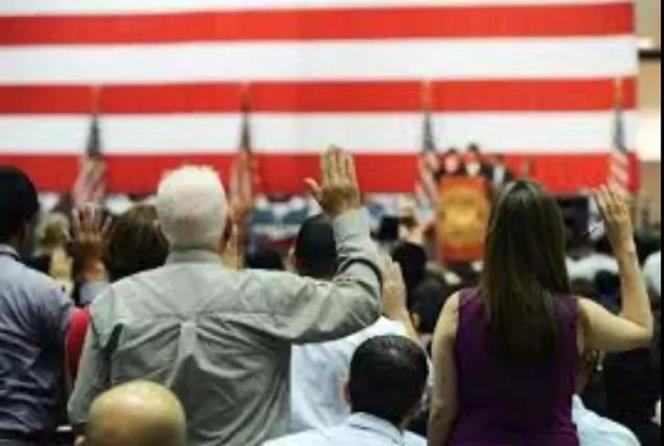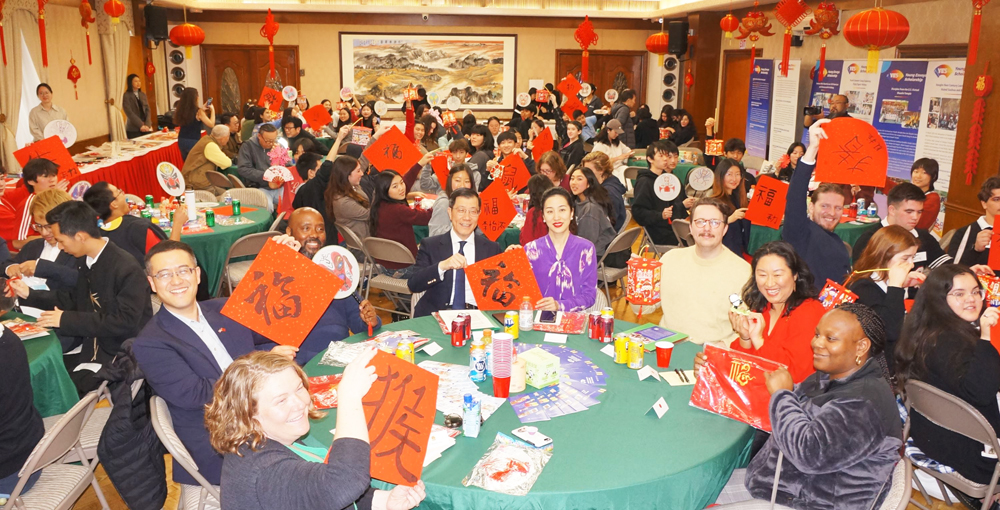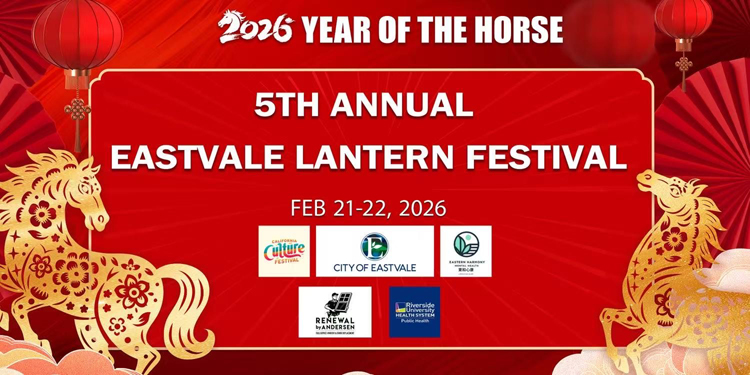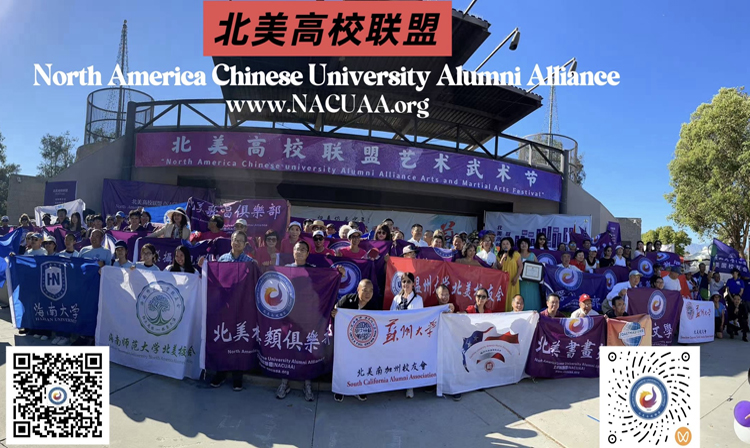2016年12月7日 星期一
喜吉利等國會眾議員向美國防部和國土安全部發函 尋求歸化非公民軍人
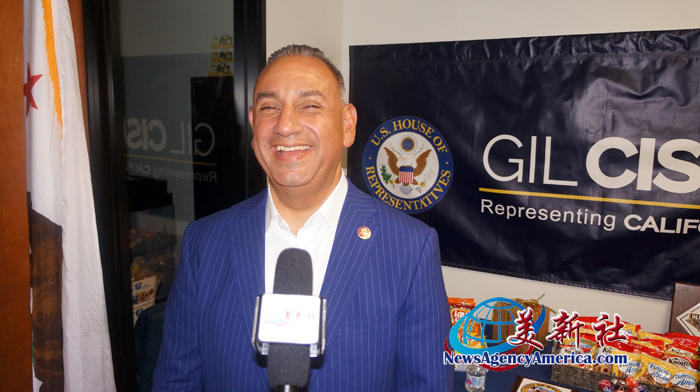
(美新社資料圖片)
【美新社洛杉磯訊】9月12日,美國國會眾議員喜吉利(Gil Cisneros)聯同多位美國眾議員,向美國國防部和國土安全部發出一封信函,尋求政府規劃那些非公民軍人。
作為美國國會眾議院軍事委員會成員、喜吉利(Gil Cisneros,CA-39),與國會眾議員埃斯科巴(Veronica Escobar,TX-07)、國會眾議員卡瓦哈爾(Salud Carbajal)共同發起起草這封信函,並發送給美國國防部長Mark Esper 和美國國土安全部代理部長Kevin McAleenan,信中針對尋求國防部(DOD)就現行政策,讓非公民從軍人員入籍的程序,以及國土安全部、特別是美國公民及移民服務局(USCIS)的具體非公民從軍人員入籍的審核方法的各種疑問的答复。
2017年,美國國防部發布了一份備忘錄,概述了尋求歸化入籍的非公民軍事人員審批過程的若干變化。
近年來,申請和獲得美國公民身份的從軍人員數量的(大量)下降引起了人們的嚴重關切,而這些機構的政策可能會打擊那些為尋求和實現歸化入籍,為保衛美國國家而犧牲生命的人。
在這份信函中,立法議員們寫道,“我們對美國公民和移民服務局(USCIS)的數據感到困惑。在2019財政年度的第二季度,移民局拒絕了17.6%的軍人公民申請,這甚至比普通民事申請的拒絕率11%還高出6%以上。該報告同時顯示,軍人申請人在第一季度財政年度2019年拒絕率有所增加,這是過去九年中,第7次季度報告數據顯示軍人公民申請人的拒絕率高於普通民事申請人。”
立法議員們繼續說道,“我們感到困惑的是,那些滿足國防部政策備忘錄中所列要求、志願保護和捍衛美國並的从军人员,包括光榮的服務和光榮的解僱,在申请美國國籍时,被拒绝率竟然高於平民申请人。”
此次,共同聯署的立法議員們還有: Julia Brownley (CA-26), Cheri Bustos (IL-17), Tony Cárdenas (CA-29), André Carson (IN-07), Bonnie Watson Coleman (NJ -12), Gerald E. Connolly (VA-11), Jim Costa (CA-16), Charlie Crist (FL-13), Jason Crow (CO-06), Henry Cuellar (TX-28), Sharice L. Davids (KS-03), Danny K. Davis (IL-07), Adriano Espaillat (NY-13), Bill Foster (IL-11), Ruben Gallego (AZ-07), John Garamendi (CA-03), Jesús G . "Chuy" García (IL-04), Raúl M. Grijalva (AZ-03), James A. Himes (CT-04), Chrissy Houlahan (PA-06), Rick Larsen (WA-02), Barbara Lee ( CA-13), Alan Lowenthal (CA-47), Tom Malinowski (NJ-07), James P. McGovern (MA-02), Grace Meng (NY-06), Grace F. Napolitano (CA-32), Eleanor Holmes Norton (D-DC), Scott H. Peters (CA-52), Max Rose (NY-11), Bobby L. Rush (IL-01), Jan Schakowsky (IL-09), Terri A. Sewell (AL -07), Mikie Sherrill (NJ-11), Abigail D. Spanberger (VA-07), Jackie Speier (CA-14), Haley Stevens (MI-11), Mark Takano (CA-41), Dina Titus (NV -01), Paul D. Tonko (NY-20), Xochitl Torres Small (NM-02), Lori Trahan (MA-03), Juan Vargas (CA-51), 和 Marc Veasey (TX-33)。
立法議員們向美国国防部提出的问题有:
1)提交完成的USCIS表格N-426後,从军人员收到對其榮譽服務認證請求所需的平均時間是多少?
2)向美國國防部尋求公民归化的从军人員可以獲得哪些支持服務?
3)有多少美國移民局代表或其他移民官員,可以幫助國防部人員解決國防部的公民歸化問題和相關流程?
4)單位指揮官為非公民从军人員實施新的國防部政策,會得到什麼指導? 請分享這樣的指導。
5)國防部做出哪些努力來確保可能符合入籍資格的从军人員了解必要的步驟和標準,並做出必要的準備工作?
立法議員們向美國公民和移民服務局(USCIS)提出的问题有:
1)評估公民身份申請的標準是什麼?
2)審查和裁定來自普通平民和从军成員的申請的評估標準是否有所不同? 如果是,請解釋這些差異。
3)處理从军成員申请所需的平均時間是多少?
4)拒絕从军成員申請的最常見理由是什麼?
5)美國公民及移民服務局計劃在2020年8月前關閉13個國際外地辦事處。這些關閉將如何影響从军人員的申請?
6)如何解釋拒絕普通平民和从军人员申請人群的差異?
信函的原文如下:
Dear Secretary Esper and Acting Secretary McAleenan:
We write to request further information regarding the process by which non-citizen servicemembers, including lawful permanent residents (LPRs), may seek naturalization and the adjudication of their applications. The precipitous drop in the number of servicemembers applying for and earning U.S. citizenship in recent years raises serious concerns that policies by your agencies may be impeding those who have put their lives on the line to defend our nation from seeking and attaining naturalization.
Regarding the process by which non-citizen servicemembers, including LPRs, may seek naturalization, we are aware that the Department of Defense (DoD) issued a policy memorandum in 2017 outlining several changes to the certification process for military servicemembers seeking naturalization. Of course, we recognize the importance of addressing potential counterintelligence threats and related national security concerns—and we appreciate DoD’s efforts to ensure the security of any recruitment pathway. However, media reports suggest that the new policy has had a chilling effect—unit leaders that would have previously provided assistance or guidance for servicemembers filling out required paperwork to apply for naturalization are no longer doing so. Our concern, therefore, is principally focused on ensuring non-citizen servicemembers, including LPRs, are aware of what is required to seek naturalization and the resources available to them to that end. We believe that where there are non-citizen servicemembers serving honorably in the U.S. Armed Forces, there should be a clear and efficient process to seek certification for such honorable service and, ultimately, naturalization.
Turning to the review of naturalization applications, we are puzzled by what we have found in the U.S. Citizenship and Immigration Services’ (USCIS) data. In the second quarter of fiscal year 2019, USCIS denied 17.6 percent of military applications for citizenship—more than 6 percent higher than the 11 percent civilian application denial rate. The report marks an increase from the first quarter fiscal year 2019 denial rate for military applicants (16.6 percent) and it is the seventh quarterly report out of the last nine that has noted a higher rate of denial for military applicants than civilian applicants. We are baffled that those servicemembers who volunteered to protect and defend the United States and fulfilled the requirements outlined in the DoD policy memorandum, to include honorable service and honorable discharge, would be denied at a rate higher than the civilian population seeking U.S. citizenship.
In order to better understand how DoD implements the policy outlined in the 2017 memorandum and the criteria by which USCIS evaluates servicemember applications for citizenship, we request your responses to the following questions:
For DoD:
- What is the average time it takes for a servicemember to receive a response to a request for certification of honorable service once a completed USCIS Form N-426 is submitted?
- What support services are available to servicemembers seeking citizenship on DoD installations in the United States?
- How many USCIS representatives or other immigration officials are available to assist DoD personnel with naturalization questions and related processes on DoD installations?
- What guidance do unit commanders receive to implement the new DoD policies for non-citizen servicemembers? Please share such guidance.
- What efforts does DoD make to ensure servicemembers who may become eligible for naturalization understand requisite steps and criteria and can make necessary preparations?
For USCIS:
- What are the criteria by which you evaluate applications for citizenship?
- Are the evaluation criteria for reviewing and adjudicating an application from a civilian and that of a servicemember any different? If so, please explain those differences.
- What is the average time it takes to process a servicemember application?
- What are the most common justifications for denial of a servicemember application?
- USCIS plans on closing 13 international field offices by August 2020. How will these closures impact servicemember applications?
- How do you explain the disparity in rates of denial to civilian and military applicant populations?
Thank you for your time and attention to this matter. We look forward to your response.
